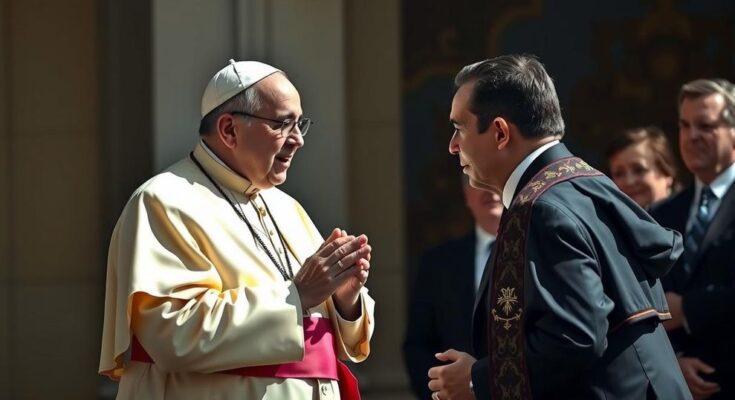Pope Francis commemorated the 40th anniversary of the Treaty of Peace and Friendship between Chile and Argentina, which resolved a significant border dispute. He emphasized the importance of dialogue and negotiation in peacebuilding, while condemning the hypocrisy of nations that promote peace yet invest in arms. The Pope called for a model of friendship rooted in divine connection as essential for overcoming current global conflicts.
On November 29, 1984, Chile and Argentina reached a significant milestone by signing the Treaty of Peace and Friendship, which effectively resolved a prolonged border dispute over the Beagle Channel that had previously brought them to the brink of war in 1978. This pivotal agreement, facilitated by the Holy See and the mediation efforts of Pope St. John Paul II, has been commemorated by both nations as a vital step toward regional stability in South America.
During a ceremony held in the Vatican to honor this treaty, Pope Francis emphasized the importance of dialogue and peaceful negotiations in resolving conflicts. He reiterated that the dedication exhibited by both nations during the lengthy discussions serves as a commendable model for the world, particularly in times when global tensions and conflicts persist.
Pope Francis highlighted the significance of the values embedded within the treaty—peace and friendship—stating that those principles should be re-emphasized amidst ongoing global conflicts. He underscored the necessity of moving away from violence and coercion, drawing attention to the contemporary issues of injustice, inequality, and climate crises, which exacerbate tensions across various regions. The Pope urged for a collective commitment to openness and dialogue, underscoring that true happiness stems from the establishment of amicable relations grounded in a connection with God.
Moreover, the Pope articulated concerns regarding the contradiction faced by nations that advocate for peace while simultaneously investing in armaments, labeling such actions as hypocritical, which inevitably leads to failures in achieving fraternity and peace. He concluded by invoking divine blessings upon Argentina, Chile, and all nations pursuing harmony, entrusting their aspirations to the intercession of Mary, Queen of Peace.
The treaty between Chile and Argentina serves as a historical example of successful diplomacy and conflict resolution, underscored by the involvement of the Holy See, particularly during the pontificate of St. John Paul II. The treaty was born out of necessity as tensions had escalated over territorial claims, representing a significant shift from potential military confrontation to peaceful negotiations. The ongoing relevance of this agreement is illustrated by Pope Francis’s reflections on its implications for contemporary global conflicts, reinforcing the need for dialogue and mutual understanding.
In summation, the Treaty of Peace and Friendship signed between Chile and Argentina epitomizes the power of dialogue and negotiation in the resolution of conflicts. Pope Francis’s remarks remind us of the necessity for continued commitment to peace, friendship, and the exclusion of violence in addressing present-day global crises. His call for an authentic connection with God as the foundation for dignified relations among nations resonates in the ongoing efforts to cultivate peace worldwide.
Original Source: www.vaticannews.va




